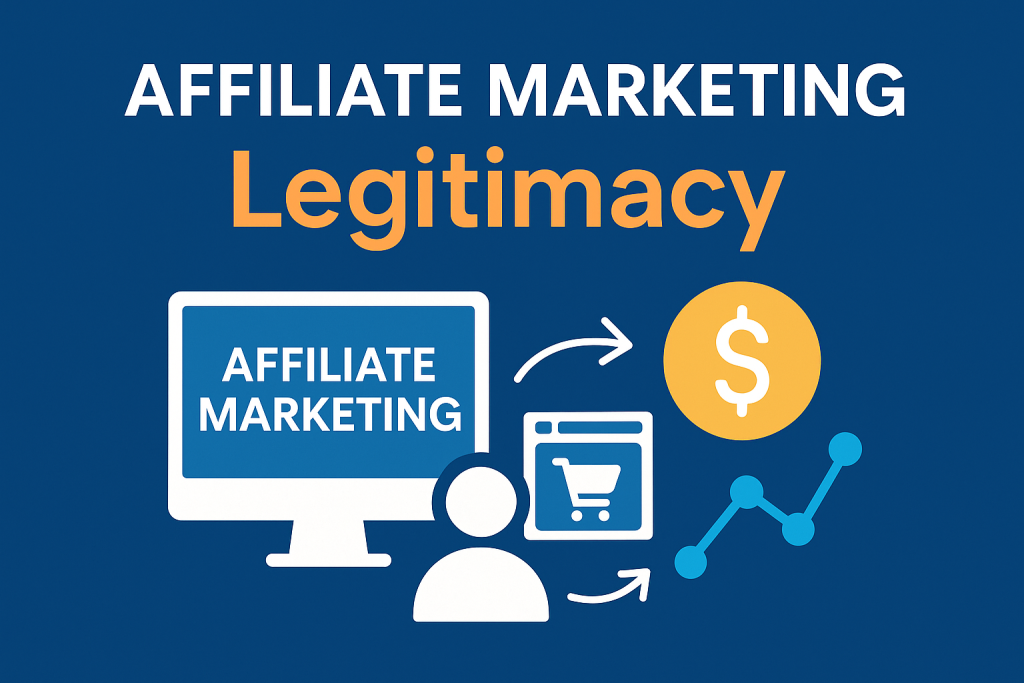
Wondering is affiliate marketing a scam? With promises of passive income and online income, it’s easy to question is affiliate marketing actually legit or just another hyped-up scheme. Many beginners ask is affiliate marketing a legit side hustle, does affiliate marketing really pay, and is it worth trying affiliate marketing in 2025. This guide addresses these concerns, explains how affiliate marketing works, and helps you start safely as a beginner. Let’s dive into the facts behind this legitimate business model and debunk myths for good.
What Is Affiliate Marketing?
To answer is affiliate marketing a scam, let’s start with the basics. Affiliate marketing is a performance-based online business where you earn commissions by promoting products or services through unique affiliate links. When someone buys via your link, you get paid—simple as that.
How it Works
- Sign up for affiliate programs like Amazon Associates
- Choose products relevant to your niche (e.g., fitness gear, software).
- Share links on your blog, YouTube, or social media.
- Earn 2–75% commissions per sale or action.
Unlike scams, affiliate marketing requires no upfront fees or inventory, making it a side hustle accessible to beginners. Learn promotion strategies in our Social Media Marketing category.
Is Affiliate Marketing Actually Legit?
Is affiliate marketing actually legit? Yes, it’s a cornerstone of digital marketing. The industry is projected to hit $37.3 billion in 2025, with millions earning online income through reputable affiliate programs. Major brands like Amazon, Bluehost, and Udemy rely on affiliates to drive sales.
Why the skepticism? Misconceptions stem from:
- Hype: Ads claiming “millions overnight” mislead beginners.
- Shady Schemes: Some programs charge fees or lack value, tainting the industry.
- Effort: Success takes time, unlike “get-rich-quick” promises.
Trusted platforms like ShareASale prove that affiliate marketing is a legitimate business. For beginners, it’s a low-risk way to start an online business.
Is Affiliate Marketing a Legit Side Hustle?
Is affiliate marketing a legit side hustle? Absolutely. It’s one of the most flexible ways to earn passive income in 2025. You can work from home, set your schedule, and scale your efforts over time. Here’s why it shines as a side hustle:
- Low Cost: Start with a free blog or social media account.
- No Inventory: Promote products without handling stock.
- Flexible Hours: Perfect for students or professionals with day jobs.
For example, a blogger promoting tech gadgets via Amazon Associates can earn $100–$1,000/month within 6–12 months. Need content creation tips? Check our Freelancing category.

Does Affiliate Marketing Really Pay?
Does affiliate marketing really pay? Yes, but earnings depend on your niche, strategy, and effort:
- Beginners: $100–$1,000/month after 6–12 months.
- Intermediate: $1,000–$10,000/month with optimized content.
- Experts: Six figures annually with multiple affiliate programs.
High-ticket programs like CJ Affiliate offer 20–50% commissions on software, while Amazon Associates provides 2–10% on physical products. Success stories include bloggers monetizing niche sites or influencers promoting courses via ClickBank.
Pro Tip: Drive traffic with SEO or social media to boost earnings. See our Social Media Marketing category for strategies.
Is It Worth Trying Affiliate Marketing in 2025?
Is it worth trying affiliate marketing? Yes, especially for beginners seeking a low-risk side hustle. Here’s a balanced view:
Pros
- Low Investment: Start with minimal costs (e.g., free blog platforms).
- Scalability: Grow passive income across multiple niches.
- Flexibility: Work anytime, anywhere.
- Opportunity: E-commerce growth fuels demand for affiliates in 2025.
Cons
- Time-Intensive: Building traffic takes 6–12 months.
- Learning Curve: Requires SEO, content, or social media skills.
- Competition: Sub-niches (e.g., “eco-friendly tech”) offer less competition.
With dedication, affiliate marketing is a legitimate business worth trying. Learn content creation in our Freelancing category.
Why People Think Affiliate Marketing Is a Scam
The question is affiliate marketing a scam often arises due to myths and bad actors:
- Unrealistic Claims: Ads promising instant wealth mislead beginners.
- Scammy Programs: Some schemes charge fees or focus on recruitment, resembling pyramid schemes.
- Lack of Results: Newbies expecting quick wins may feel misled when success takes effort.
Unlike pyramid schemes, affiliate marketing pays for promoting products, not recruiting others. Stick to ethical marketing with trusted programs.
How to Avoid Affiliate Marketing Scams
To ensure is affiliate marketing actually legit for you, avoid scams with these tips:
- Choose Reputable Programs: Join Amazon Associates, ClickBank, or ShareASale.
- Avoid Fees: Legitimate programs are free to join.
- Research Reviews: Do your own research on different affiliate programs and platforms.
- Check Product Value: Ensure the program offers real products, not just hype.
Example: Avoid schemes promising “millions overnight” or recruitment-heavy models. Focus on legitimate business practices.

How to Start Affiliate Marketing Safely
Ready to start a legit side hustle? Follow these steps for is affiliate marketing a scam-free success:
- Pick a Niche: Choose a passion like fitness or finance. Use Google Trends for demand.
- Join Trusted Programs:
- Amazon Associates: Physical products.
- ClickBank: Digital products.
- ShareASale: Diverse niches.
- Build a Platform:
- Blog with WordPress (see Freelancing category)
- YouTube for reviews.
- Instagram or TikTok for visuals Social Media Marketing.
- Create Content:
- Write guides (e.g., “Best Tech Gadgets 2025”).
- Review products with affiliate links.
- Disclose: “This post contains affiliate links.”
- Drive Traffic:
- Optimize for SEO (use Yoast SEO).
- Share on Pinterest or X.
- Build an email list with a lead magnet (e.g., “Free Affiliate Checklist”).
- Track Results:
- Use Google Analytics for traffic.
- Test link placements for conversions.
Read How to Start Affiliate Marketing in 2025 for a step-by-step guide.
Common Mistakes to Avoid
To ensure does affiliate marketing really pay, avoid these errors:
- Promoting low-quality products, damaging trust.
- Skipping SEO, reducing visibility for is it worth trying affiliate marketing.
- Omitting disclosures, risking FTC violations.
- Expecting instant results instead of building a long-term online business.

